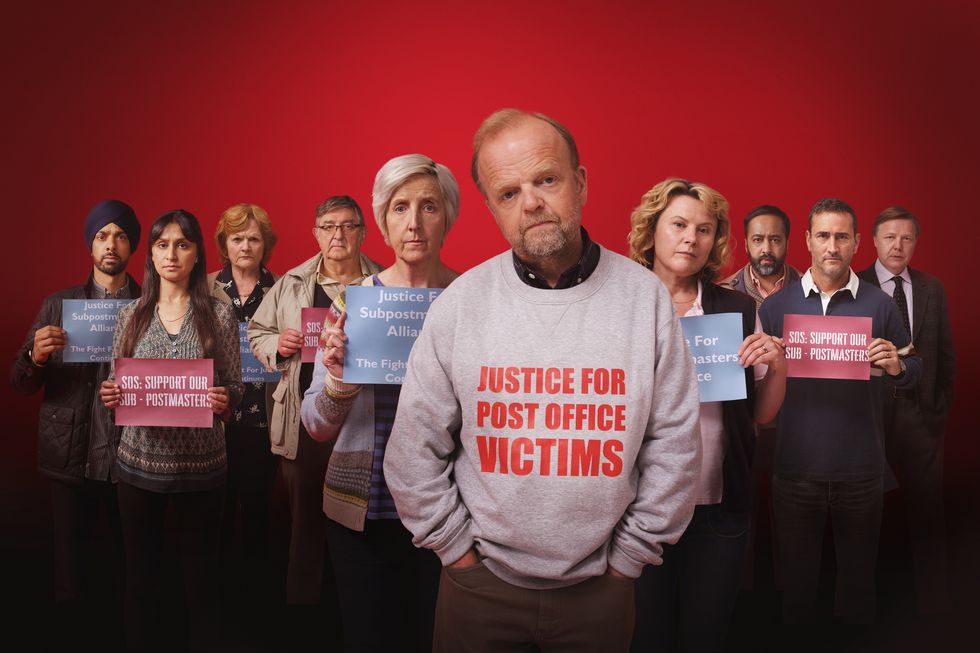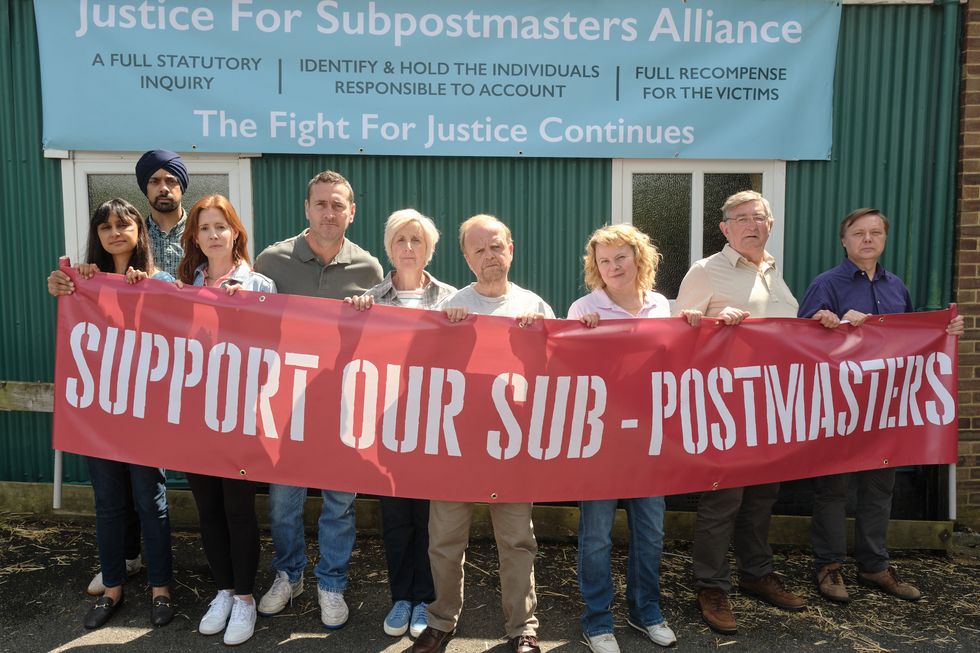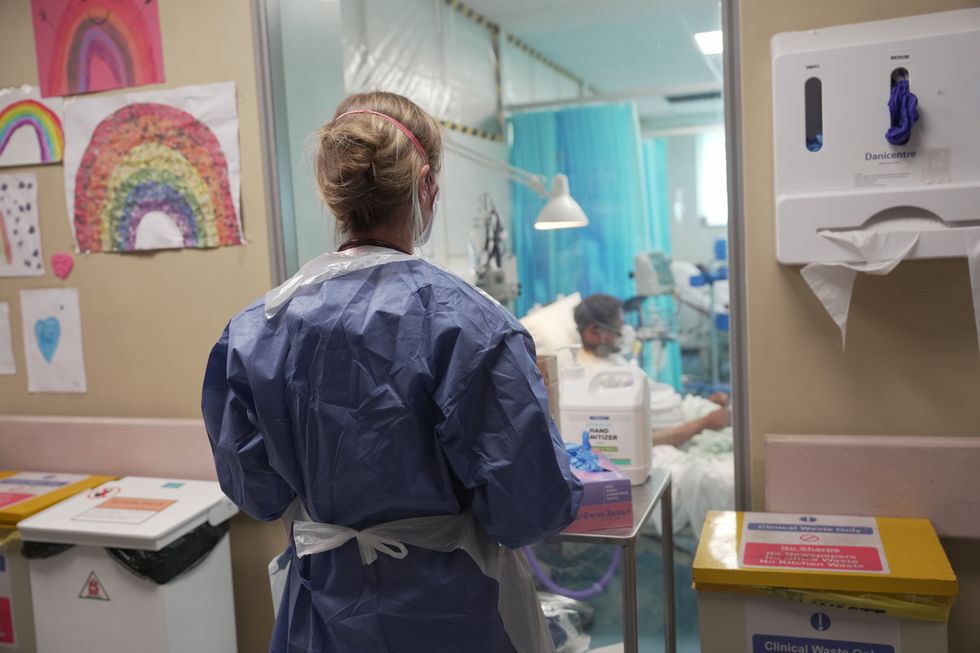As Mr Bates Vs The Post Office has shown – and we hope Jed Mercurio’s new series on the Covid-19 pandemic proves – television dramas can be a powerful medium for shifting the dial.
A couple of years ago my mum mentioned, in passing, the ‘Post Office scandal’. I assumed she was lamenting the price of a first class stamp (again). She brought it up once more at Christmas. I politely nodded along, wondering why she was harping on about such philatelist matters (though have you seen the price of a first class these days? One whole pound and twenty-five pence and still it doesn’t guarantee next day delivery).
Then I, alongside 10 million other Britons, switched on the TV on New Year’s Day and realised this wasn’t about postage or delayed parcels, but something far more serious. ITV’s excellent Mr Bates vs The Post Office is a four-part drama re-enacting the shocking treatment of post office workers by its bosses over two decades. Between 1999 and 2015 some 900 sub-postmasters and sub-postmistresses (note to the PO, during your moment of reckoning, it might also be time to update these gendered titles) were subject to numerous erroneous accusations of theft and false accounting after money went missing from the service.
As we now know, it was not the people that were dodgy, it was good old modern technology. Horizon–owned by tech giant Fujitsu–was installed to streamline stocktaking and accounting, but many postmasters and postmistresses encountered a bug that appeared to show increasingly large shortfalls in cash. Despite this happening to hundreds of workers the Post Office insisted that individuals were not only to blame, but were responsible for covering the losses, often in the thousands of pounds. This continued for 16 years, despite the PO receiving hundreds of calls a day from people pleading for help and knew, from at least 2010, that the financial system was flawed. People lost their businesses, homes, marriages, friends, and reputations. Over 700 workers were prosecuted for criminal wrongdoing, 230 people went to prison and 60 others died before justice was served. For some, the shame, stress, humiliation and castigation was too much: Louise Mann, Peter Huxton, Fiona McGowan and Martin Griffiths all died by suicide or suspected suicide.
And for years, no one seemed to care.
Until, that is, ITV and its small yet mighty miniseries. So incensed were we by what we saw on January 1, 2024 that the show quickly went viral. The outrage from the public became so loud, so impossible to ignore that less than a week after Mr Bates… aired, Prime Minister Rishi Sunak promised justice for those affected and announced new legislation to exonerate wrongly convicted Post Office branch managers. Those with overturned convictions will be offered £600,000, while others who have already received some compensation will be offered £75,000 each. Just an FYI, we the taxpayer will be footing this approximately £450 million bill, not the Post Office (who last year boshed its boss a £140k bonus) and not Fujitsu (you know, the one worth $26 billion).
Redemption was here, and it was powered the people. So how did this dramatisation manage not only to captivate a nation, but bring about real and meaningful change? How on earth was it able to cut through our streaming, scrolling, social media feeds and Spotify playlists so successfully over the course of four nights?
Primarily perhaps, Mr Bates… is a really solid show. It’s well acted (standing ovation to Toby Jones, Julie Hesmondhalgh, Monica Dolan) and well written (Gwyneth Hughes). Seeing the lives of these everyday people upended so casually, so coldly by those in charge made it impossible to watch without feeling complete and utter fury on the behalf of all those affected. Seeing also the way the workers and their families came together to take on the system was incredibly moving and inspiring.
There’s also something about seeing familiar faces – not least of all Hesmondhalgh, who plays the titular character’s determined partner Suzanne – that helps humanise these stories for us. Actors from Happy Valley, Corrie and Harry Potter are as recognisable to us as our neighbours, him from the gym or the woman who runs our local post office. This happened to people just like us from communities just like ours.
The impact of Mr Bates… is almost unprecedented, yet it’s not the first time that TV has (ahem) moved the dial. Back in the Sixties, Ken Loach’s BBC TV film Cathy Come Home not only radically altered the general public’s opinions on homelessness, but it led to a change in policy that meant families could be kept together in hostels (they’d previously been segregated by gender). Coincidentally airing two days before the launch of Shelter, it also gave the homeless charity a huge boost. Incidentally, Loach’s 2016 Cannes-winning film, I, Daniel Blake also brilliantly revealed the realities of those dependent on foodbanks and how easily that can happen – again – to any of us. Once more, people’s presumptions and prejudices were successfully challenged and replaced instead by empathy, understanding and anger at the injustices that are so rife in our society.
Over on Channel 4, after Russell T. Davis’s masterful miniseries It’s A Sin, about the AIDs crisis, aired in January 2023 it created a surge in people being tested for HIV and a 3000% jump in Google searches about ‘AIDS’. It remains Channel 4’s most-watched drama series ever. The station’s docudrama Partygate also proved particularly powerful when it screened during the Conservative party conference in 2023, with the Guardian declaring it 'a giant, exploding grenade of a TV show' and 'a vital document of a moment of national shame'. The New Statesman said it should 'inspire a revolution'.
There’s hope too that a new series examining the early months of Covid-19 from the perspective of a palliative care doctor will finally see those in government held to accountability for some of the, frankly, devastatingly poor decisions made during 2020. Breathtaking from Jed Mercurio, the writer behind Line Of Duty and himself a former doctor, told the Times this week: ‘The British public [get] to decide what kind of country we want this to be and what kind of public servants we want occupying high office. And what we’ve seen in the Post Office scandal, the dramatist lights the match but it’s the public that carries the fire.’
Disney’s Dopesick, alongside the documentary featuring American photographer Nan Goldin – All The Beauty and the Bloodshed – both brilliantly highlighted the opioid epidemic in America and the role played by billionaire pharmaceutical dynasty Purdue Pharma, owned by the Sackler family.
Not only did the Sackler's company find itself at the heart of the crisis, but their tainted dosh is spread throughout the art world, which outraged artist Nan, herself a former heroin and opioid addict. OxyContin, made by Purdue Pharma, was one of the prescription opioids that was responsible for the deaths of 145 people a day in the US, yet the family were allowed to have their name on wings at the Tate, The Guggenheim and the National Gallery. Not on Nan's watch. Though many of her successes happened before or during the filming of the doc, Nan and her organisation PAIN (Prescription Addiction Intervention Now) successfully had the Sackler name removed from many leading institutions across the world, including the V&A.
We have been a bit slack though, haven’t we? To be fully abreast of British current affairs, we could all very easily switch on the TV on a Sunday morning (like my mum clearly does) and watch BBC politics show Sunday with Laura Kuenssberg – or stay up late during the week to watch ITV’s Peston. In fact, we could watch both, anytime, on demand. But do we? No. Just one and a half million of us Sunday brunch over Kuenssberg, small numbers considering our population of 55 million. Consider also that the so-called 'Post Office scandal' has been televised previously. Panorama first covered it back in 2015 and have revisited the story twice more. Plus, there’s been over 1,000 articles written in the press. Maybe – and this is just a suggestion – maybe we should all try watching a bit more political television. Maybe we’d get More. Sh*t. Done.
After all, who knew watching 'the box' could bring about real, meaningful, lasting change, especially when spiralling TikTok figures tells us we have increasingly short attention spans? Shows like Mr Bates…, It’s A Sin and Dopesick prove that when it matters, when it’s done well, maybe, just maybe that’s the time to spark the flame that lights the fire of revolution.
















